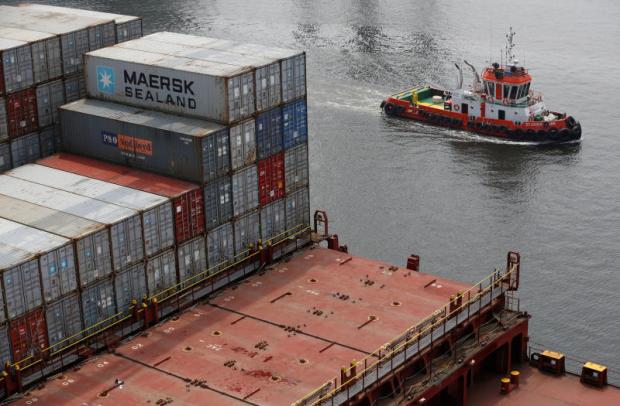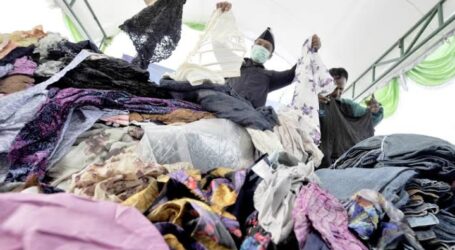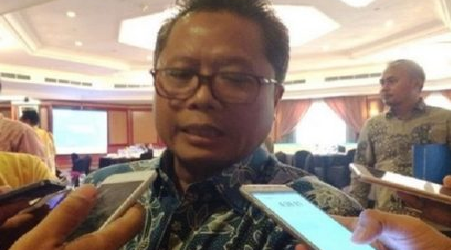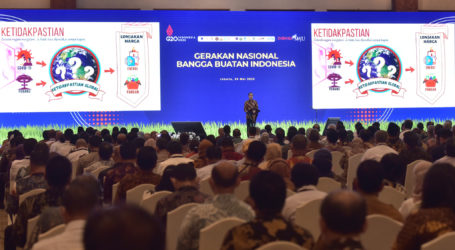Indonesian Government Tightens Inflow of Imported Goods

Jakarta, MINA – The Indonesian government stated that it would immediately implement various regulations to tighten the flow of imported goods. The tightening was made to increase the number of imported goods in traditional markets and e-commerce.
Efforts to tighten imported goods were discussed at a meeting at the Presidential Palace in Jakarta on Friday.
“Well, imported (goods) will certainly disrupt the market share of domestic products, then there will be rampant illegal imports of second-hand clothing and layoffs will also occur in the textile industry sector,” said Coordinating Minister for Economic Affairs Airlangga Hartarto after attending the meeting as quoted from Republika Online.
Therefore, the government will issue various regulations to tighten imports of certain commodities, which include children’s toys, electronics, footwear, cosmetics, textile goods, traditional medicines and health supplements, apparel, and apparel accessories, as well as bag products.
“The number of HS codes that have been changed is 327 postal codes, for certain products there are 328 postal codes for apparel, 23 HS codes for bags. “And currently what is a post border has been changed to a border with import approval and a surveyor’s report,” said Airlangga.
Indonesia has handled several commodities, both prohibited and/restricted goods (lartas), namely 60 percent and non-lartas, namely 40 percent. The government also supervises general importers regarding the enforcement of post border regulations at the border, as well as deepening the steps for receiving at the border so that the service level agreement and response are consistent so as not to increase the dwelling time.
Border control, namely supervision carried out by Customs officers in the customs area. Meanwhile, post border control is carried out after leaving the customs area and circulating in the community (free circulation/market) which is supervised by the relevant ministry/institution.
Indonesia is the country with the second best dwelling time after Singapore, with the time calculated from the time the container is unloaded on the ship until the goods leave the port, namely 3.2 days. Airlangga said that changing the policy from post border to border would be followed by improvements to regulations from the relevant ministries/institutions.
Changes and improvements to regulations will soon be carried out by the Ministry of Agriculture, Ministry of Trade, Ministry of Industry, POM Agency, Ministry of Health, Ministry of Energy and Mineral Resources, and Ministry of Communication and Information.
“Mr President (Joko Widodo) asked that this derivative ministerial regulation be immediately revised within two weeks,” said Airlangga.
Tightening of imported goods has also been regulated in Minister of Trade Regulation (Permendag) Number 31 of 2023 concerning Business Licensing, Advertising, Development and Supervision of Business Actors in Trading Through Electronic Systems. In this regulation, the government prohibits e-commerce from selling products directly from abroad or cross border for products priced below 100 US dollars.
In line with this regulation, the electronic commerce platform Shopee officially stopped cross-border sales. Head of Public Policy Shopee Indonesia Radityo Triatmojo said that his party always makes adjustments to government regulations.
“We can say that products sold cross-border on Shopee are not products that compete directly with MSME products. Because we have closed 14 categories of cross-border products that compete with MSME products in accordance with the direction of the Ministry of Cooperatives and SMEs in 2021,” said Radityo.
This closure of products from abroad takes effect from Wednesday at 22.00 WIB. Currently, cross border transactions on Shopee are recorded at less than 1 percent.
Apart from that, the cross border mechanism implemented is also in accordance with the processes in applicable laws and regulations such as taxation.
Radityo explained that so far the cross border carried out by Shopee Indonesia aims to ensure that local products also have the same opportunity and the same opportunity to access the export market directly.
Currently, there are more than 20 million local MSME products available in cross-border markets in the ASEAN region, East Asia and Latin America.
“We will try, even though the closure of cross-border sellers in Indonesia, will not affect the export activities of Indonesian products that are currently underway,” said Radityo.
Minister of Trade Regulation 31/2023 is a revision of Minister of Trade Regulation 50/2020 which regulates electronic commerce. In this new regulation, it is stated that the minimum price is set at 100 US dollars per unit for finished goods from abroad which are directly sold by traders to Indonesia via cross-border e-commerce platforms.
Apart from that, a positive list is also provided, namely a list of goods from abroad that are allowed to cross the border “directly” into Indonesia via electronic trading platforms.
The Center of Economic and Law Studies (Celios) asked the government to increase production for MSME players. This can be done through increasing production, standardization and certification for domestic MSME players.
Director Celios Bhima Yudhistira believes that this increase must also have adequate quality control so that MSME products sent to consumers are products that have passed quality tests.
“How domestic MSMEs can be stimulated in terms of production capacity, standardization, certification, they have to be good,” he said to Republika on Friday.
Regarding banking interest, Bhima continued, it is also a crucial matter for MSME players. This is because the interest given to MSMEs is still relatively high and they only rely on people’s business credit.
“Regarding interest, there are several crucial problems when competing for goods from China, while to borrow capital you have to pay five percent, that’s also the KUR facility, while outside KUR, the interest for MSMEs can be 20 percent, even borrowing loans can reach up to 190 percent per year,” he said.
He compared this with China, which provides loan facilities with interest below 20 percent for MSMEs. Therefore, Bhima asked the government to encourage cheap financing if domestic products are competitive.
“What about the capacity and empowerment of human resources because in many ministry empowerment programs the output has not been measurable and targeted, especially the labeling of MSMEs going digital, even though it is still partial,” he said. (T/RE1/P2)
Mi’raj News Agency (MINA)






